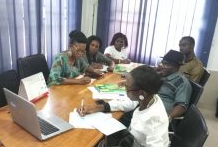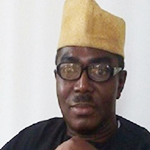Guaranteeing a Healthy Future Generation: Integrating Adolescent & Youth Friendly Services at the Primary Health Care Level
Guaranteeing a Healthy Future Generation: Integrating Adolescent & Youth Friendly Services at the Primary Health Care Level
By: Francis Eremutha. Blog originally published on MSH’s LeaderNet
![[A gynecologist consults a patient at the NISA Premier Hospital in Abuja, Nigeria. Photo Credit: Gwenn Dubourthournieu]](https://msh.org/wp-content/uploads/2020/08/msh_abuja_nisa_premier_hospital_15.05.2014_04_715px.png)
Management Sciences for Health (MSH), with funding from the Global Financing Facility (GFF) and the Partnership for Maternal, Newborn, and Child Health (PMNCH), serves as the host organization for the Small Grants Mechanism supporting coalitions of civil society organizations (CSOs) to improve women’s, children’s, and adolescents’ health. The Women Friendly Initiative (WFI), as the lead organization for the NAYA youth coalition based in Nigeria, is one of the recipients of these small grants.
Adolescents in Nigeria are caught between traditional culture and changing social norms brought about by urbanization, globalized economies, and an influential media-saturated environment. With evolving attitudes, including less restrictive sexual norms without comprehensive sexual education, there have been increased rates of unprotected sex, unplanned pregnancies, unsafe abortions, sexually transmitted diseases, and HIV/AIDS. These increased rates buttress the fact that at minimum, all adolescents require age-appropriate, comprehensive sexuality education achievable through access to youth-friendly health services designed to promote their sexual and reproductive health and rights (SRHR).

In efforts to meet the sexual and reproductive health needs of young people in Nigeria, Women Friendly Initiative (WFI), through a small grant funded by the Global Financing Facility (GFF) and the Partnership for Maternal, Newborn & Child Health and managed by Management Sciences for Health (MSH), undertook a 12-month advocacy project beginning in July 2019 in Benue, Nassarawa, and Kwara States, and the Federal Capital Territory.
During the year-long project, WFI worked with the Novel Association for Youth Advocacy (NAYA), a coalition of youth-serving organisations, to carry out advocacy activities. WFI worked with 12 member organizations under NAYA to build the capacity of 48 advocates in effective advocacy, domestic resource mobilization, and accountability. Using the technical skills gained, the advocates from NAYA focused on advocating for the implementation of the “National Guidelines for Integrating Adolescent and Youth Friendly Health Services into Primary Health Care Facilities in Nigeria” and the “National Guidelines on Promoting Access of Young People to Adolescent and Youth Friendly Health Services in Primary Health Care Facilities in Nigeria.”
WFI has been able to support NAYA in multiple impactful activities beyond even the scope of the small grant, including:
- Offered direction to The Jomurota Community Care Initiative, allowing them to receive system strengthening support from an EU funded project, Agents for Citizen Driven Transformation ACT
- Provided mentorship to EarthSpring Outreach International who is now receiving joint resource mobilization as a member of a consortium
- Provided a recommendation letter as part of a grant by UN Women that was successfully awarded to the Women, Environment & Youth Development Initiative (WOYODEV) was awarded a grant by UN WOMEN
- Provided support to the Benue State Chapter of NAYA leadership who successfully advocated for the government to release funds to program managers to implement Adolescent and Youth Friendly Health Services (AYFHS)
- Facilitated membership of the Kwara state NAYA Chapteronto the State Budget Preparation and Review Committee
- Supported the establishment of a Nasarawa state Adolescent Technical Working Group and endorsed a NAYA representative – Family Health Care Foundation (FAHCI) – as the groups’ first chairperson
- Acquired a free weekly column in “The Voice Newspaper” dedicated to NAYA activities
- Sponsored eight NAYA coalition members for a two day GFF organized training on Adolescent and Youth Sexual Reproductive Health and Rights, culminating in the inclusion of four NAYA Coalition members in the GFF Steering Committee currently developing indicators for scoring and tracking adolescent and youth investment and outcomes in Nigeria
- Utilized working relationship with the Ministry on Adolescent & Youth Health to include NAYA Coalition members in the Federal Ministry of Health led review of the National Policy on the Health and Development of Adolescent and Young People in Nigeria
By the end of the year-long project, the Novel Association for Youth Advocacy will have improved its network, capacity, and skills to monitor continuous implementation of youth friendly health services in-line with the commitments obtained from state actors, thereby ensuring the health and wellbeing of Nigeria’s future generation.

Francis Awasighe Eremutha, MPH, PhD is the CEO for Women Friendly International (WFI) and is responsible for the overall coordination and management of all WFI programs/projects since 2016. He has over three decades of demonstrable leadership, research and programmatic experience in population, malaria, gender, policy, HIV/AIDS, water and sanitation and comprehensive reproductive health. Dr. Eremutha gained experience while providing high level leadership and managerial functions in proven international organizations for over 24 years including AFRICARE Nigeria, European Union, Water–Aid, Pathfinder International, and Planned Parenthood Federation of America. He authors several books and publications in maternal, adolescent and young person’s health and family planning. He has extensive experience in building partnerships, coalitions, networks and managing multi-donor and multi-sectoral programs and collaborations. He is a mentor of young public health professionals and has served as lead investigator in several cross-cultural research on adolescence and youth, comprehensive sexual reproductive health and rights, and water sanitation.